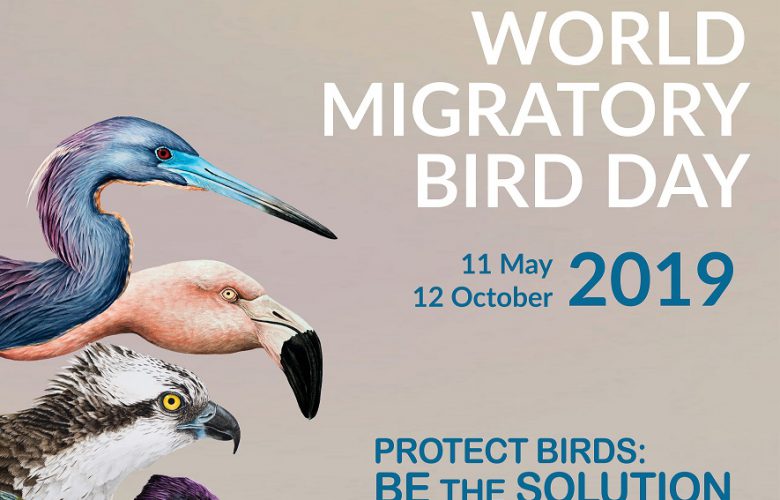World Migratory Bird Day, 2019
World Migratory Bird Day is a day set aside to celebrate and reiterate the obligation for the conservation of migratory species and their habitats. The Day is celebrated annually on 9 May and 12 October, and the United Nations Environmental Program (UNEP), the Convention on the Conservation of Migratory Species of Wild Animals (CMS) and […]

World Migratory Bird Day is a day set aside to celebrate and reiterate the obligation for the conservation of migratory species and their habitats. The Day is celebrated annually on 9 May and 12 October, and the United Nations Environmental Program (UNEP), the Convention on the Conservation of Migratory Species of Wild Animals (CMS) and the Africa-Eurasian Waterbird Agreement (AEWA) are the organisations that support this global awareness campaign. Worldwide, a number of local and international conservation organisations organises events; awareness-raising, lecture series, and campaign programmes on the importance of conserving these animals and their habitats.
This is especially significant because of the increasing threats to migratory species, particularly seabirds but also other aquatic animals, where plastic pollution and its associated consequences pose a great threat to their survival. It is not surprising why this year’s theme for World Migratory Bird Day is “Protect Birds: Be the Solution to Plastic Pollution”. Nigeria with a population of over 200 million people, the rate at which plastics are produced and not recycled is seriously alarming! It has become a norm for most Nigerians to throwaway plastics in the street, surrounding every nook and cranny, with water sachet and shopping bags been the most prominent.
Studies indicated that plastic bags take 450 years to degrade; instead, they degrade into smaller particles called microplastics, and many studies reported their presence in many animal species. Empirical evidence showed that the number of animal species known to have been affected by plastics (either ingestion or entanglement) has doubled in the last two decades from 267 to 557 species among all groups of animals. The number of seabirds dying from the effects of plastic every year is currently 1 million and growing. In just two decades, between 1960 and 1980, the number of birds found ingesting plastic has grown from 5% to 80%, which is unprecedented. This pinpoints the urgency of this matter:
These plastics have been found not only affecting animals, but also human health and other environmental issues, contaminating soil and water just to mention a few. Sadly, the effects of these plastics to our aquatic animals and human health in Nigeria is poorly studied and address. In Nigeria, these plastics and the habit of throwaway has become one of the most pressing issues to conservationists and environmentalists, everywhere looking very dirty. In particular, Lagos and Kano, where a human population surge is notable examples. Our beaches, wetlands, and other aquatic systems full of plastics looking very unattractive and disgusting that cannot attract any recreational activities.
Evidence show that the total economic damage caused by plastics waste to the marine environment (an invaluable habitat for our seabirds and many threatened species) amount to $13 billion annually. Apart from this, it also has negative impacts on tourism, fishing and shipping industries. Many countries, including Nigeria, have adopted the Extended Producers Responsibility (EPR) policy, where responsibility for recycling used plastic bottles is shouldered by the manufacturer. While countries as Germany and South Africa successfully achieved this, Nigeria is yet to enforce this. Kenya and Rwanda on one hand, have completely banned the used and importation of plastic bags.
To change our attitude, there is a need for public enlightenment on the negative consequences of plastic waste on our health, environment and animals. Proper and sufficient disposal systems should be provided, especially where human gathered (like markets, schools, etc.), while companies manufacturing these bags should collect and recycle them from the streets. Besides this, these companies are encouraged to come up with better packaging designs as done elsewhere (those that can degrade easily) to enable conserved and provide a suitable habitat for our wildlife, while achieving Sustainable Development Goals (SDGs). Field studies and lab experiments will share invaluable information about the impacts of these plastics on wildlife species.
Let us unite our voices to address this rapidly growing environmental concern and bird conservation!
Happy World Migratory Bird Day 2019
Abubakar Surajo Ringim, Biological Sciences Department, Federal University Dutse, P.M.B. 7156, Dutse, Jigawa State, Nigeria
[email protected], 08060823804
